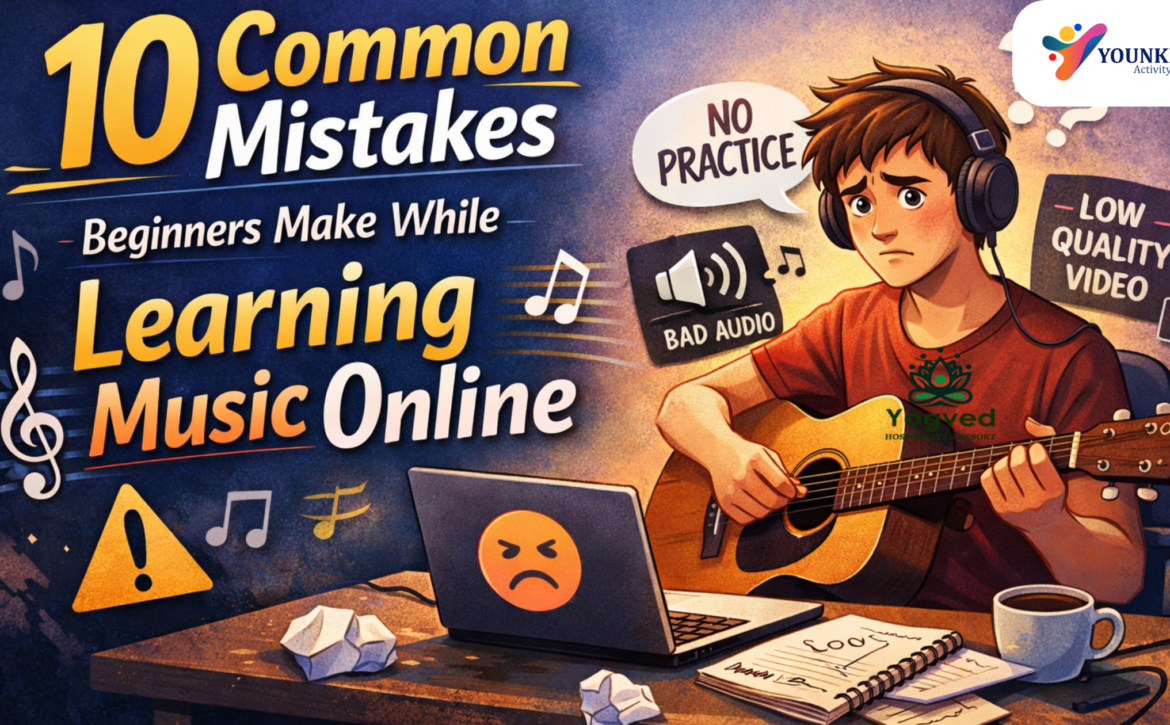Easy Exercises to Practice Violin Notes for Absolute Beginners
Violin notes are overwhelming at the beginning. However, the right approach and structured exercises can make things much easier. But violin notes form the foundation of all violin playing, regardless of whether pursuing classical, contemporary, or traditional musical styles.
Younker Activity Hub has helped thousands of beginning violinists through their first steps with violin notes. We create a systematic approach that builds confidence while developing essential musical skills. Our experience shows that students who master fundamental violin string notes early in their training progress faster and develop better musical intuition throughout their learning journey.
Understanding Violin String Notes: The Foundation
Beginners must understand the four open violin string notes that form the basis of all violin music. Each string produces a specific pitch when played without pressing any fingers on the fingerboard, and these open strings serve as reference points for all other violin notes.
The four open violin string notes from lowest to highest pitch are:
- G String (4th String): The thickest string produces the lowest pitch.
- D String (3rd String): The second string is a perfect fifth above G.
- A String (2nd String): The third string is a perfect fifth above D.
- E String (1st String): The thinnest string produces the highest pitch.
Understanding these fundamental violin string notes is crucial because they are anchor points for finger placement and intonation. Our comprehensive violin lessons program emphasizes mastering these open strings before progressing to more complex violin notes.
Professional instruction makes a significant difference in learning violin notes correctly. Structured guidance from experienced tutors is invaluable for students. This is especially helpful for beginners, who need to know and develop a proper foundation and musical understanding through guided assistance.
Essential Exercises for Learning Violin Notes
Exercise 1: Open String Mastery
The foremost skill a beginner needs to develop is learning violin notes proficiently. You start with the open strings using proper bow techniques. Regular exercise will eventually build the foundation for young learners on violin music notes and essential bowing skills.
Practice Steps:
- Start with the G-string, drawing long, smooth bow strokes
- Focus on producing a clear, consistent tone without scratches or squeaks
- Practice whole bow strokes (from frog to tip and back)
- Repeat on each string: G, D, A, E
- Play scales between open strings to understand pitch relationships
These exercises help build bow control and a firm grip over violin string notes.
Exercise 2: First Position Finger Patterns
As a beginner, once you are comfortable with open violin string notes, you can easily catch basic finger patterns to create additional notes on each string. The first position covers the most commonly used violin notes. Once you reach there, you develop an excellent understanding of reading violin notes in sheet music with time.
Basic First Position Pattern on Each String:
G String Notes:
- Open G
- 1st finger: A
- 2nd finger: B
- 3rd finger: C
- 4th finger: D
D String Notes:
- Open D
- 1st finger: E
- 2nd finger: F#
- 3rd finger: G
- 4th finger: A
This pattern continues on the A and E strings. Soon you will learn a complete range of violin notes in first position.
Continuous practice, attention to intonation, and mastering finger strength, muscle, and memory will prove essential for proficiently playing violin music notes in the future.
Exercise 3: Scale Practice for Note Recognition
Scales are fundamental exercises – equally needed for mastering violin notes and developing musical ear training. When you begin with simple scales, you can understand note relationships and develop technical skills simultaneously for playing the violin music notes.
Recommended Beginner Scales:
G Major Scale (One Octave):
- Uses open G and D strings as anchor points
- Introduces fundamental finger patterns
- Builds familiarity with major scale intervals
- Excellent preparation for reading violin sheet music
D Major Scale:
- Starts on the open D string
- Reinforces first-position finger patterns
- Develops cross-string playing technique
- Essential for understanding the relationships between violin notes relationships
Our Carnatic violin program includes both traditional Indian and Western scales. A comprehensive education on violin notes can help build a solid technical foundation needed to master diverse musical traditions.
Exercise 4: Rhythm and Note Duration Practice
Understanding violin notes involves more than pitch recognition. There are note durations and rhythmic patterns to learn. Our exercises combine violin notes with basic rhythm training, so the students are extensively prepared to read violin sheet music easily.
Rhythmic Exercise with Open Strings:
Using a violin notes chart for reference, practice these rhythmic patterns:
- Whole notes (4 beats each on open strings)
- Half notes (2 beats each)
- Quarter notes (1 beat each)
- Mixed rhythms combining different note values
This exercise will help students perfect their timing and easily recognise violin string notes. They will also develop coordination skills, like bow speed with note duration. Such skills are essential for laying violin music notes more expressively.
Exercise 5: Simple Melody Practice
The final foundational exercise involves playing simple melodies based on the violin notes. Attention to nurturing technical skills and musical expressions enables students to combine individual violin notes and create beautiful music.
Beginner-Friendly Melodies:
“Mary Had a Little Lamb” using violin notes B-A-G:
- Simple three-note melody perfect for beginners
- Uses notes easily accessible in the first position
- Introduces melodic phrasing concepts
- Builds confidence in playing recognizable tunes
“Twinkle, Twinkle, Little Star” variations:
- Incorporates more violin notes from the first position
- Develops finger independence and coordination
- Excellent for practicing rhythm and pitch accuracy
- Prepares students for reading violin notes in sheet music
These exercises will help learners combine introductory violin notes and create meaningful music.
Using Violin Notes Charts and Sheet Music
A comprehensive violin notes chart is an invaluable reference tool for beginning students learning violin notes. Visual charts help students understand finger positions, note names, and relationships between different violin string notes.
Effective Chart Usage:
Fingering Charts:
- Exact finger placement for each violin note
- Both note names and finger numbers
- Multiple positions for the same pitch
- Enharmonic equivalents
Staff Notation Charts:
- Connect violin notes to traditional music notation
- Show where each pitch appears on the musical staff
- Prepare students for reading a violin notes sheet
- Build sight-reading skills essential for advanced playing
String-Specific Charts:
- Focus on violin string notes for each string
- Show the complete range of notes available in the first position
- Help students memorize fingerboard geography
- Support accurate intonation development
Our Western classical violin program includes violin notes, chart materials, and practical exercises so students can develop their theoretical knowledge and practical skills simultaneously.
Building Proper Technique While Learning Violin Notes
Violin notes require attention to proper technique from the very beginning.
Poor habits usually develop at the initial stages of learning. Such unhealthy habits are a major disruption in a student’s musical journey. One classic example is physical strain.
Essential Technique Elements:
Left Hand Positioning:
- Proper thumb placement behind the neck
- Curved fingers for optimal reach and accuracy
- Relaxed hand position, preventing tension
- Correct wrist alignment for comfortable playing
Our detailed guide on proper hand placement for beginners covers instruction on developing correct technique while learning violin notes.
Bow Technique for Clear Notes:
- Straight bow strokes perpendicular to the strings
- Appropriate bow pressure for clear tone production
- Smooth bow changes between notes
- Dynamic control for musical expression
Intonation Development:
- Using open violin string notes as reference points
- Careful listening and adjustment for pitch accuracy
- Understanding finger spacing for different intervals
- Developing musical ear for precise violin notes
An integration of proper techniques with violin notes helps accelerate progress and prevent common problems.
Students who focus only on technique will not develop reliable skills. Hence, their confidence in music will suffer.
Progressive Learning Path for Violin Notes
Successful violin note mastery follows a logical progression that builds skills systematically while maintaining student engagement and motivation. Our approach ensures that every student can progress at their own pace through the gradual development of core foundations that will eventually scale their musical career.
Beginner Level Progression:
Phase 1: Foundation Building (Weeks 1-4)
- Master open violin string notes with proper bowing
- Develop fundamental finger strength and coordination
- Learn to read simple violin notes and chart references
- Build consistent practice habits
Phase 2: First Position Exploration (Weeks 5-12)
- Add first finger notes on each string
- Practice simple scales using learned violin notes
- Begin reading basic violin sheet music
- Play simple melodies combining multiple notes
Phase 3: Musical Application (Weeks 13-24)
- Expand to complete the first position violin notes
- Play increasingly complex melodies and exercises
- Develop sight-reading skills with violin music notes
- Begin exploring different musical styles and genres
Cultural Enrichment Through Violin Notes
The violin’s versatility allows students to explore classical European repertoire, traditional folk music, contemporary popular music, and rich musical traditions worldwide. Once students learn violin notes completely, this is possible.
Musical Tradition Exploration:
Indian Classical Music:
- Carnatic and Hindustani violin music notes and ornamentations
- Traditional ragas and melodic patterns
- Cultural context and historical significance
- Connection to heritage and family traditions
Western Classical Tradition:
- European classical violin notes and techniques
- Historical development of violin repertoire
- Understanding of classical music structure and form
- Appreciation for timeless musical masterpieces
Contemporary Applications:
- Modern violin music notes in popular genres
- Film music and contemporary composers
- Jazz and fusion applications of violin notes
- Creative expression through diverse musical styles
For example, our jazz violin program demonstrates how your violin note knowledge can easily help you to explore different musical genres. Students with versatile skills can easily learn diverse musical expressions.
Technology and Online Learning for Violin Notes
Modern technology enhances violin note learning through interactive tools, high-quality video instruction, and comprehensive learning resources. Online learning platforms prove convenient, giving students access to expert instructions, regardless of where they are located. This makes quality violin education accessible to students worldwide.
Digital Learning Advantages:
Interactive Tools:
- Digital violin notes chart with audio playback
- Metronome applications for rhythm practice
- Tuning apps for accurate violin string notes adjustment
- Recording capabilities for practice assessment
Flexible Instruction:
- Expert teachers available regardless of location
- Personalized lesson scheduling for busy families
- Recorded sessions for repeated review and practice
- Progress tracking and assessment tools
Comprehensive Resources:
- A library of violin notes and music sheet
- Videos demonstrating proper techniques
- Cultural context and historical information
- Community support (fellow students and instructors)
A combination of traditional teaching and modern technology creates optimal learning environments for students seeking mastery in violin notes.
Assessment and Progress Tracking
Regular assessment keeps students’ progress steady, especially in violin notes. Areas needing additional attention are identified and worked on. Structured evaluation also allows students to understand their progress.
Assessment Components:
Technical Evaluation:
- Accuracy of violin notes, intonation, and pitch
- Quality of bow technique and tone production
- Finger positioning and left-hand technique
- Reading skills with violin notes and sheet music
Musical Development:
- Expression and phrasing in simple melodies
- Rhythm accuracy and timing consistency
- Style awareness in different musical genres
- Creative application of learned violin notes
Progress Milestones:
- Mastery of all open violin string notes
- Accurate first position violin notes playing
- Sight-reading simple violin music notes
- Performance of complete pieces using learned techniques
Regular assessment provides students and parents with a clear understanding of progress while systematically ensuring that learning objectives are met. This approach maintains high standards while celebrating achievements at every stage of development.
Building Long-Term Musical Success
Learning violin notes is the first step in a lifelong musical journey. The foundations built during the beginning of violin notes study influence all future musical development and achievement.
Long-Term Benefits:
Personal Development:
- Discipline and patience through consistent practice
- Confidence through musical achievement and performance
- Creativity and artistic expression opportunities
- Stress relief and emotional outlet through music
Cultural Connection:
- Understanding of diverse musical traditions and heritage
- Appreciation for historical and contemporary music
- Connection to community through musical participation
- Preservation of cultural traditions for future generations
Academic and Social Benefits:
- Enhanced cognitive development through music study
- Improved academic performance in multiple subjects
- Social connections through musical ensembles and groups
- Leadership opportunities in musical organizations
The time investment in learning violin notes right from the beginning helps establish a solid foundation, which stays lifelong. Students who master these fundamentals under expert guidance develop skills and appreciation that enrich their lives in countless ways.
Our comprehensive online music education platform demonstrates how quality violin notes instruction contributes to broader musical education goals while honoring individual learning styles and cultural backgrounds.
Why Choose Younker for Learning Violin Notes
Younker Activity Hub brings a proven approach to help students like you master violin notes in no time. This approach typically combines expert instruction and flexible online learning. Additionally, the experienced faculty, who bring authentic musical heritage from Indian classical and Western traditions, ensure students receive proper guidance from day one.
Our curriculum involves a systematic approach to scale a student’s progress, starting from introductory violin notes to advanced musical concepts. Simultaneously, our technology platform provides interactive violin notes chart tools, recorded lessons for practice, and real-time feedback to help them scale their improvement with time.
Additionally, students benefit from internationally recognized certifications and access to diverse musical styles through our Carnatic, Western classical, and jazz violin programs.
Affordable pricing, flexible scheduling, and a proven track record of student success make Younker Activity Hub a quality option for learners seeking mastery in violin notes, accessible worldwide.
Your Musical Journey Starts with Violin Notes
Violin notes are the foundation for playing the instrument. This guide’s exercises, including violin string notes and simple melodies, are systematically curated to guarantee a successful learning experience for students at different levels.
One should remember to start their journey with a proper technique. Here, they can use a violin notes chart for reference. Consistent practice and seeking expert guidance further enhance the development. With our dedicated approach, learning violin notes becomes an achievable and rewarding journey.
Ready to begin? Contact Younker Activity Hub today to start your violin journey with expert instruction, proven methods, and comprehensive support for mastering violin notes.
Frequently Asked Questions
Q1: How long does it usually take beginners to learn violin notes?
Most beginners can pick up the open string notes (G, D, A, and E) within the first 2–3 weeks of regular practice. Moving on to first-position notes often takes another month or so, meaning it generally takes 4–8 weeks to get comfortable with the basics. Of course, progress depends on how often and effectively you practice and the guidance you receive. Our teaching method is designed to help students build a strong foundation early on, which makes advancing to more complex techniques much smoother.
Q2: Do I need a violin notes chart when starting?
Yes, a notes chart is an invaluable tool for beginners. It shows where each finger goes on the fingerboard, the names of the notes, and how they connect with written music. A good chart links staff notation with finger positions, making it easier to understand theory and practice. We provide students with detailed charts and pair them with exercises to develop visual recognition and muscle memory for accurate playing.
Q3: What’s the difference between violin strings and violin notes?
The violin has four strings (G, D, A, and E), each producing a different base pitch. These are called the “string notes.” Violin notes include every pitch you can play by placing your fingers in various spots along the strings. The string notes are anchors for tuning and intonation, while the complete set of violin notes covers the entire range. Understanding both is key to becoming confident with the violin.
Q4: Can I really learn violin notes through online lessons?
With today’s technology, online learning can be as effective as in-person instruction. Video demonstrations, audio examples, and interactive charts make it easy to follow. Our online lessons combine traditional methods with digital tools, offering step-by-step guidance and personalised feedback. Many students even find they progress faster online thanks to flexible scheduling and the ability to review recorded sessions.
Q5: How should I practice reading violin sheet music as a beginner?
Start small. Use a notes chart to match staff positions with where they fall on the fingerboard. Begin by identifying the notes on the page before playing them, then move on to short, simple exercises. Stick to first-position notes at first and slowly add more as you grow comfortable. In our program, sight-reading practice is built into the lessons so students strengthen both reading skills and playing technique at the same time.
Enroll Now : Online Guitar Classes









